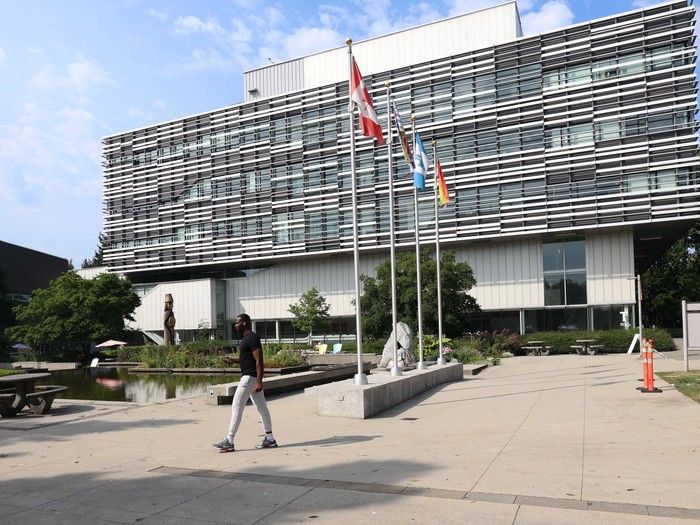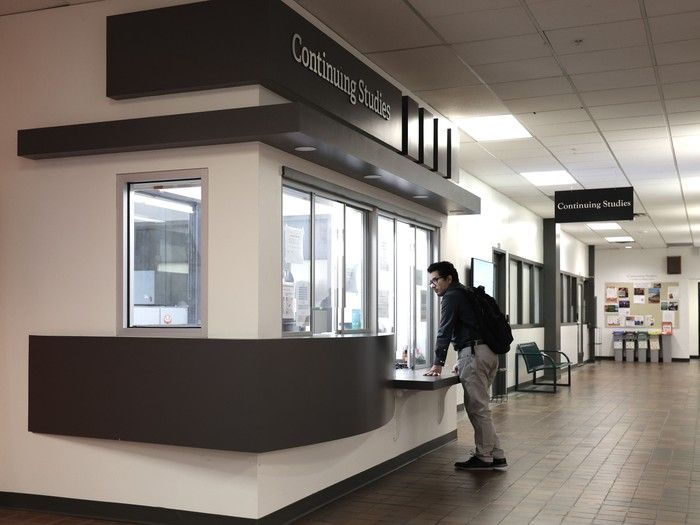![VANCOUVER, B.C., August 27, 2025 - Scenes from Langara College as the institute struggles to adapt after a significant number of foreign students will be lost due to Federal government policy, in Vancouver, B.C., August 27, 2025. (NICK PROCAYLO/PNG)
10108976A [PNG Merlin Archive] VANCOUVER, B.C., August 27, 2025 - Scenes from Langara College as the institute struggles to adapt after a significant number of foreign students will be lost due to Federal government policy, in Vancouver, B.C., August 27, 2025. (NICK PROCAYLO/PNG)
10108976A [PNG Merlin Archive]](https://smartcdn.gprod.postmedia.digital/vancouversun/wp-content/uploads/2025/08/png0827nlangara-09_298314692-1.jpg)
B.C.’s major universities and colleges are facing staff cuts and tighter budgets as international student enrolment falls under federal study permit caps.
Kwantlen Polytechnic University, the University of Victoria, the University of B.C., Simon Fraser University and Langara College have reported international enrolment declines of as much as 60 per cent, leading some schools to lay off dozens of full-time staff.
The downturn stems partly from Ottawa’s decision to cap international study permits. Immigration, Refugees and Citizenship Canada has said it will issue 437,000 permits to foreign students in 2025, down from 650,000 in 2023.
Brent Calvert, president of the Federation of Post-Secondary Educators of B.C., calls the decline a “wake-up call” for the sector.
Calvert says the trend shows that shrinking federal and provincial support, combined with heavy reliance on higher international tuition, is putting the financial sustainability of colleges and universities at risk.
“Some form of program suspension or review is happening at every institution to offset the government’s lack of funding by raising tuition for new students,” said Calvert.
He is now urging provincial and federal governments to step in with targeted funding to help the sector recover from the steep drop in international tuition revenue.
“If nothing is done, these cuts will just continue to worsen,” Calvert said.

At Kwantlen, acting president Diane Purvey told staff in a memo Tuesday that international enrolment fell sharply this fall, down 60 per cent to 2,360 students compared with the same semester two years ago. Up to 45 full-time positions will be cut to offset the steep revenue shortfall.
“KPU continues to experience large declines in international student enrolment because of federal government changes,” wrote Purvey. “International study permit processing times and increased study permit denial rates are now the biggest barrier for international students seeking admission to Canada.”
She warned the effect will be long-lasting: “The impact will be felt in future years as students who graduate and leave are not replaced by equivalent numbers of incoming students.”

Purvey said the university has already opted not to fill 20 vacant positions, cut $3.3 million in discretionary spending and decided against renewing temporary contracts. The demand has fallen most sharply at KPU’s Melville School of Business, where eight instructors have been issued layoff notices with end dates in January 2026.
“We are deeply disappointed these additional reductions are necessary,” she wrote.
Other B.C. educational institutions are reporting similar fallout.
About 2,400 international students will take classes at Langara College this fall, which is half as many as two years ago. President Paula Burns said this has prompted reduction notices for 69 employees.
“To adjust to lower enrolment, we’ve had no choice but to move forward with the difficult process of reducing our total employees,” Burns said. “It’s not just about roles — it’s about colleagues and friends who have given so much to our community, and saying goodbye is incredibly hard.”
International enrolment at the University of Victoria is expected to be 40 per cent lower this fall than in 2023, with 1,340 students compared to 2,109, a spokesperson said.
They said changes to federal study permit rules have created “uncertainty and volatility” in international enrolment and, in turn, operating budgets. The UVic Board of Governors approved a balanced 2025-26 budget in March without cutting programs, “because of previous year budget reductions, government support, recruitment and retention efforts, and improved efficiencies.”
While UBC and SFU did not provide figures, both confirmed they have been affected by the federal caps on international students.
“Between 2023 and 2025, all Canadian post-secondary institutions including UBC, have seen a decline in international enrolment,” said Matthew Ramsey, UBC’s director of university affairs.
“Decreases in international students are impacting some parts of the university more significantly than others. This has included reduced operating budgets and staff reductions in some units,” said Ramsey, noting that UBC’s Applied Science department has been affected.
In a statement, an SFU spokesperson said “changes in government policies, particularly those affecting international student enrolment and visa regulations, continue to cause uncertainty.”
“We are also actively working with the provincial and federal governments to raise awareness of the impact of policy changes on our university and our sector, and how that translates to the economy,” they said.
– With files from Stephanie Ip